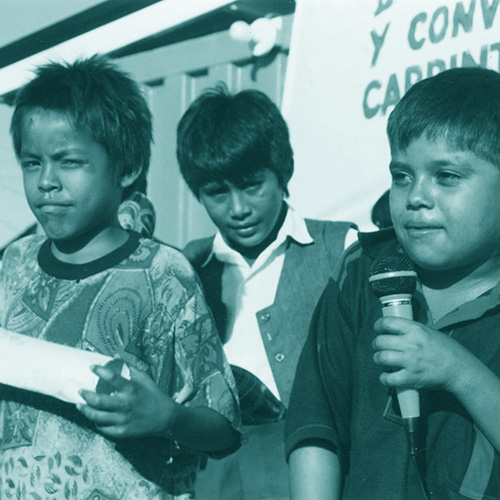Listening to working children
Listening to working children
The girls and boys organised in the movements of working children and youth want to improve their working conditions and resist blanket bans on work which are harmful to them. ProNATs advocates to ensure that children are heard and supports them by means of educational and public relations work in Europe. ProNATs does not represent the children, but rather acts as an amplifier for their voices.
ProNATs is involved in political education and public relations work...
for the differentiated assessment of child labour against the respective social, cultural and societal background of the children
against blanket bans and sanctions on child labour
for the participation of children in shaping their living conditions and employment alternatives which benefit them
against exploitation and exclusion of and violence against working children
for the recognition of children as social subjects and for questioning the bourgeois ideas of childhood that exclude contact with the world of work
against the stigmatisation of children as victims.
And this is what children have to say about their work:
"We want respect and security for ourselves and the work we do."
The blanket condemnation of child labour as a social evil and the stigmatisation of children as victims does not do justice to working children. Instead of deliberately pushing back exploitation, it contributes to abandoning working children to a lawless space. Instead of demanding bans, ProNATs wants to strengthen the rights of working children.
"We are against the exploitation of our work, we want to work in dignity and have time to learn, play and rest."
Work becomes a problem for the children when they are exploited. ProNATs takes targeted action against working conditions which do not take into account the level of development, free will and rights of the child. ProNATs demands labour rights for children and employment alternatives which support the development, self-esteem and participation of children. ProNATs supports the self-initiatives of working children and their organisations for a solidarity-based economy.
"We want the causes of our situation, especially poverty, to be identified and tackled."
Exploitative child labour can only be successfully combated if we eliminate its economic causes. ProNATs calls on politicians to take comprehensive action against poverty, starting at the roots of poverty (and wealth). Capitalist globalisation, the structural adjustment programmes of the International Monetary Fund or the World Bank, neo-colonial dependencies or the austerity measures of individual countries must not be at the expense of future generations.
"We are against the boycott of goods made by children."
Consumer boycotts and legal bans on child labour are not suitable for effectively combating exploitative child labour. They neither eliminate the causes nor the negative consequences of child labour. ProNATs calls on politicians and legislators to promote respect for children as full members of society and to take targeted action against unfair conditions.
"We are fighting for adequate and free education, for health services, for opportunities to meet and to carry out joint actions."
Without satisfactory education, health and nutrition for all, there is no equality of opportunity and social justice. ProNATs is committed to a fundamental reform of the school system. Teaching content, methods and times must also take into account the needs and experiences of working children. The current education and teaching system discriminates against poor and working children. It provokes their failure instead of supporting them and giving them the necessary knowledge for their everyday life and (later) job.
"We want to be consulted on all decisions that affect us, whether these decisions are taken in our towns and villages, our countries or internationally."
Organising freely is a recognised right, including for children. ProNATs is committed to more participation and self-determination for children in all areas of life. Working children and their organisations must be given the opportunity to participate in the revision of children's and youth laws and international conventions with a seat and a vote.
Updated: 14.12.2020
